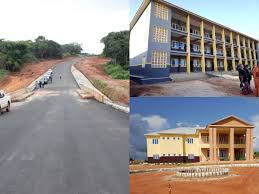Governor Peter Mbah’s administration in Enugu State has announced plans to construct 133 additional smart schools, aiming to enhance the state’s educational infrastructure. This initiative will complement the ongoing construction of 127 smart schools, bringing the total to 260, with one smart school designated for each political ward in the state.

The announcement was made following a State Executive Council meeting, where it was also revealed that the government has approved N183 billion for the construction of 141 urban roads and 20 rural roads across the three senatorial zones of Enugu. These projects are part of Governor Mbah’s broader vision to grow the state’s economy from $4.4 billion to $30 billion and achieve a zero percent poverty rate within the next four to eight years.
Prof. Chidiebere Onyia, the Secretary to the State Government, emphasized that the substantial budget increase reflects the administration’s commitment to infrastructure development. The proposed 2024 budget stands at N521.5 billion, with over N400 billion allocated for capital expenditures, significantly higher than previous budgets that ranged from N100 billion to N120 billion.
The focus on education is a cornerstone of Mbah’s strategy, with 30% of the 2024 budget earmarked for educational initiatives. The smart schools will be equipped with modern facilities, including internet access, solar power, and advanced ICT centers. Each school will feature robotics and artificial intelligence centers, well-equipped laboratories, and inclusive classrooms with interactive digital whiteboards and tablets for students.
This ambitious educational reform aims to provide quality education to all children, particularly those in remote areas, ensuring that they have access to 21st-century learning tools. Governor Mbah has stated that education is a vital weapon in the fight against poverty and is committed to revamping the educational system from basic to tertiary levels.
In addition to educational improvements, the government is also investing in road infrastructure to enhance connectivity and support agricultural production. Engr. Gerald Otiji, the Commissioner for Works and Infrastructure, provided details on the approved roads, which include significant projects such as the dualization of the 41.3 km Abakpa Nike-Opi-Nsukka Road and several other critical routes across the state.
The administration’s efforts extend to agricultural development, with nearly 200,000 hectares designated for agricultural purposes in its Land Bank. This initiative aims to boost food production and support agro-industrialization in the region.
As Enugu State embarks on these ambitious projects, the focus on education and infrastructure is expected to foster economic growth, improve living standards, and create a more conducive environment for investment and business development. The community eagerly anticipates the positive impact these initiatives will have on the state’s future.



